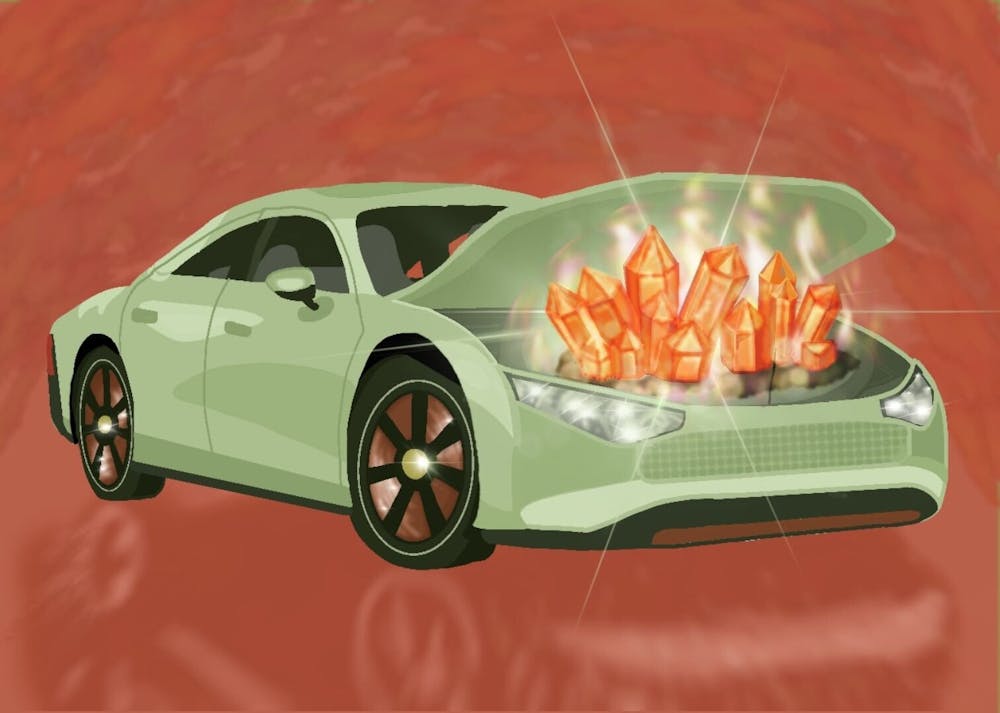A new study from ASU researchers suggests there needs to be more research done on the impacts of mining and low-carbon technology on mineral-producing countries, as most existing research focuses on countries consuming those materials.
The study, titled "Critical minerals for electric vehicles: a telecoupling review," reviewed themes in published research on critical minerals for electric vehicles to identify areas that need more attention from researchers.
The team digitally sorted through 10 years of existing studies on minerals and electric vehicles with an algorithm that helped them extract and analyze the frequency of keywords from the papers. They found a disproportionate amount of research on mineral mining and low-carbon technology, like electric vehicles, was conducted focusing on the impacts on developed countries when much of the environmental and social impact is in developing countries.
To analyze existing research, the team used what's called a telecoupling framework.
The telecoupling framework "means that one action or one behavior in a place can be remotely linked to another place which is geographically remote from that action," said Wenjuan Liu, the study's co-author and a School of Sustainability researcher.
"Consumers in Western countries like the United States or Europe or even China, they demand a lot of those low-carbon technologies to reduce their overall carbon emissions. But actually, there's rising demand (that) can cause more and more extraction activities," Liu said.
With this knowledge that Western consumer behavior increases demand for mineral mining, the team was motivated to find the feedback links in the system and analyze how they could potentially "influence the actions or behaviors or policies in those consuming countries," Liu said.
While the rise in demand for electric vehicles is helpful in the effort to reduce global carbon emissions, it is introducing sustainability issues about the critical minerals such as cobalt, nickel, lithium and other rare Earth metals required to build these low-carbon technologies.
However, published research in these areas is significantly lacking. While there are many studies on the benefits of low-carbon technology, the quantitative data on mining itself falls behind. This makes it more difficult for local newspapers in mineral-producing countries to provide information to their communities, the researchers said.
For example, the study cites socio-environmental impacts such as the use of child labor for cobalt production in the Democratic Republic of Congo, freshwater and marine degradation from nickel mining in Indonesia, and species endangerment from lithium mining in Chile.
In order to better understand the cultural and biodiversity impacts the mineral industry can have, co-author and ASU assistant professor DatuAgusdinata visited Chile in 2019 to get local researchers involved.
"Getting access to talk to local people can provide context on political social condition there," Agusdinata said. Representation from both sides "should become a model to either research."
The study highlights how consumer education can be a pivotal tool in making low-carbon technology and critical mineral mining industries more sustainable.
"If you look into the history, there's a precedent that shows that consumer pressure is quite attractive, right to change business practices," Agusdinata said. He gave examples of consumers boycotting "blood diamonds" and advocating for fair trade coffee and, because of the media coverage on these topics, consumer pressure on these industries incited change.
Educating consumers can be beneficial for industry innovation, but there is still a long road ahead.
"Even with all these good intentions, what we consider as green ... it is not green for (mineral producing countries). It will be always hard for people who will be affected in negative ways," Agusdinata said. "There's no easy answer."
According to Nalini Chhetri, a School for the Future of Innovation in Society and School of Sustainability professor who studies climate impacts and communication and impacts of technology on developing nations, creating a more equitable knowledge system can come through interdisciplinary thinking and collaborative work. The findings from shared research are considered an asset to everyone involved.
"The (countries) that have control over these emerging knowledge systems about rare Earth, all of these kinds of things, will be in the advance," Chhetri said.
The benefits of collaborative research are not limited to the scientific community, but the researchers believe higher education institutions can benefit so long as they prioritize inclusivity and intersectionality.
ASU can utilize its platform "first through this kind of academic publication. Journal articles can raise a lot of more attention in the media … and secondly ... ASU has a variety of scholarships that are supporting students and scholars who can fund their research or projects, especially for field trips," Liu said.
Reach the reporter at cbraggs@asu.edu and follow @ConteuseClaire on Twitter.
Like The State Press on Facebook and follow @statepress on Twitter.




